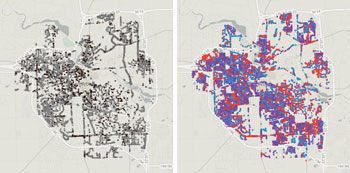FY 2015 Budget Preview: Cops, Trees
Ann Arbor city administrator Steve Powers’ proposed general fund budget for fiscal year 2015, which starts on July 1, 2014, will approach $100 million.

Left: Stumps (black) and vacant sites (gray). Right: Maples (purple), Crabapples (red) and oaks (blue). Maps by The Chronicle from the city’s 2009 tree inventory. The city administrator’s proposed FY 2015 budget includes a one-time $1 million expense to address the backlog in pruning and removal of trees that are dead or in poor condition.
Funded as part of the FY 2015 budget are five new full-time employees, four of them in public safety: one additional firefighter; three additional police officers; and an additional rental housing inspection position. The additional positions were all presented as possibilities at a Feb. 10 city council work session. The additional police positions will bring the total number of sworn officers in the city of Ann Arbor to 122.
Not previewed as a possibility at that February work session is a one-time expense of $1 million to address a backlog in critical pruning and removal of trees that are in the public right of way. The allocation comes in the context of the development of an urban forestry management plan.
The $1 million one-time expense for street trees brings the total of non-recurring expenses in the FY 2015 general fund budget to about $2.8 million. Other one-time expenses budgeted for FY 2015 are: $80,000 to cover transitional costs for art administration; $606,000 for repairs and maintenance of the city’s hydroelectric dams; $100,000 for consultants to assist with completing the downtown zoning amendments and sign inventory; $300,000 for demolition of city-owned buildings at 415 W. Washington; $200,000 for a corridor studies; and $209,000 in operational support for the Ann Arbor Housing Commission’s (AAHC) transition to a rental assistance demonstration program.
The housing commission also accounts for the bulk of a $13.8 million (17%) increase in general fund recurring expenditures compared to last year. That’s due to an accounting change that recognizes 22 AAHC employees as city employees. By recognizing revenue and expenses for AAHC employee compensation through the general fund, the AAHC can avoid the negative impact of a new accounting rule. The GASB 68 rule requires unfunded pension fund liabilities to be recorded in the financial statements for proprietary funds (like the AAHC) but not for governmental funds like the general fund.
Also included in the FY 2015 budget proposal is about $3,000 for a pilot program for closed captioning of public meeting broadcasts on the Community Television Network. According to city of Ann Arbor communications manager Lisa Wondrash, the cable commission meeting recommended approval of the money at its Feb. 25 meeting, and she notified the commission on disability issues about the pilot on April 16. The pilot will begin with meetings of the city’s commission on disability issues, with a goal of testing out a closed captioning system in July this year.
The $98.1 million of general fund expenditures in FY 2015 will include $95.3 million in recurring expenditures and $2.8 million in one-time expenses.
When the general fund is added in with the rest of the city’s budget – the street fund, water fund, sewer fund, parking fund, and the like – the total expenses proposed for FY 2015 come to $334,434,101.
Powers will present the proposed budget to the city council at its April 21 meeting, the second meeting this month. The council will need to adopt the budget, with any changes, at its May 19 meeting, also the second meeting of the month. That timeframe is specified in the city charter.
The Chronicle sat down with Powers and city CFO Tom Crawford for a conversation about the FY 2015 budget. That conversation is presented here as a Q&A. Within the context of the budget, other issues discussed include state funding, long-term planning, affordable housing, animal control, and fund balance policy. [.pdf of April 21, 2014 pre-dated memo from Powers to city council] [Full Story]



